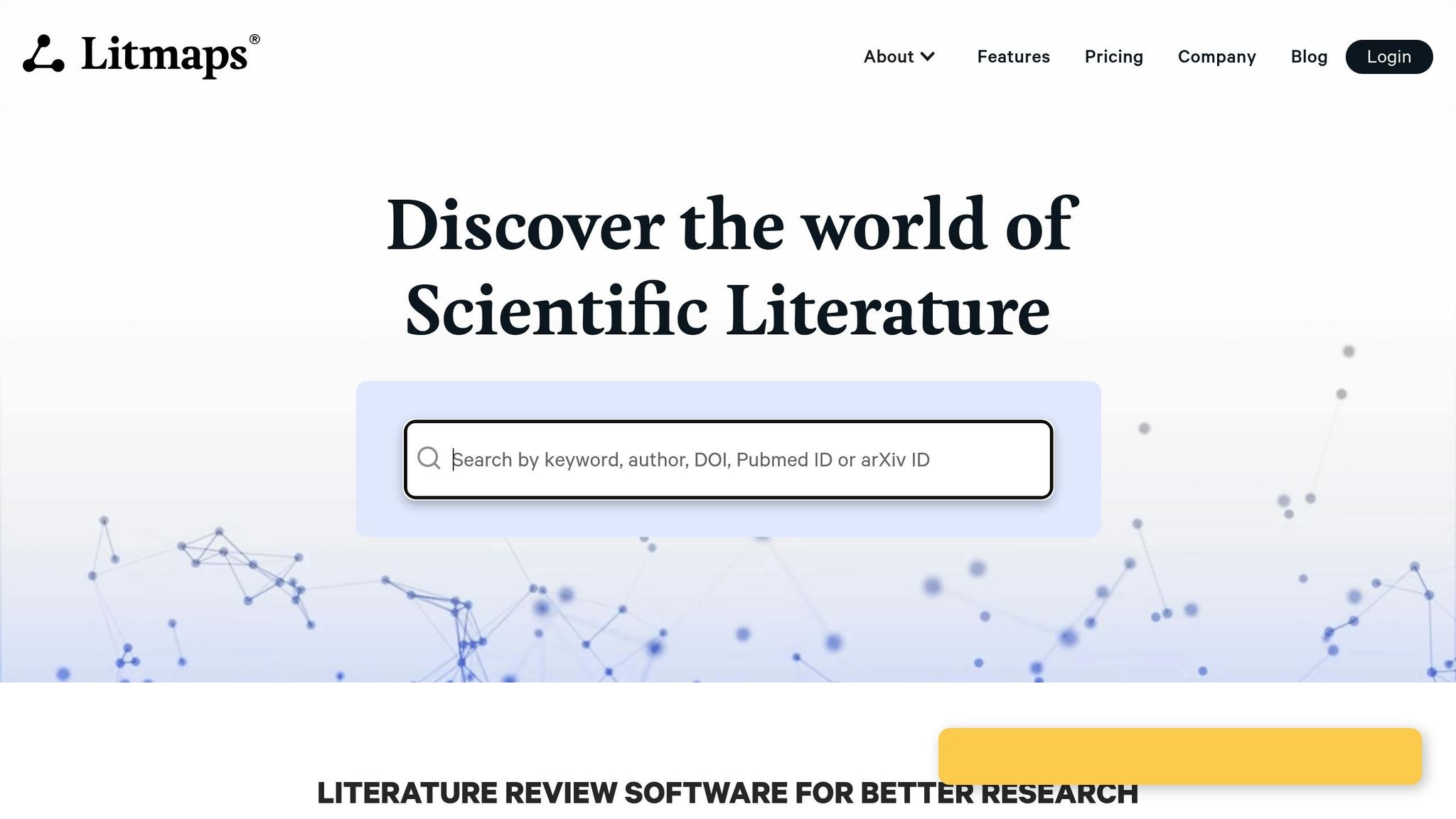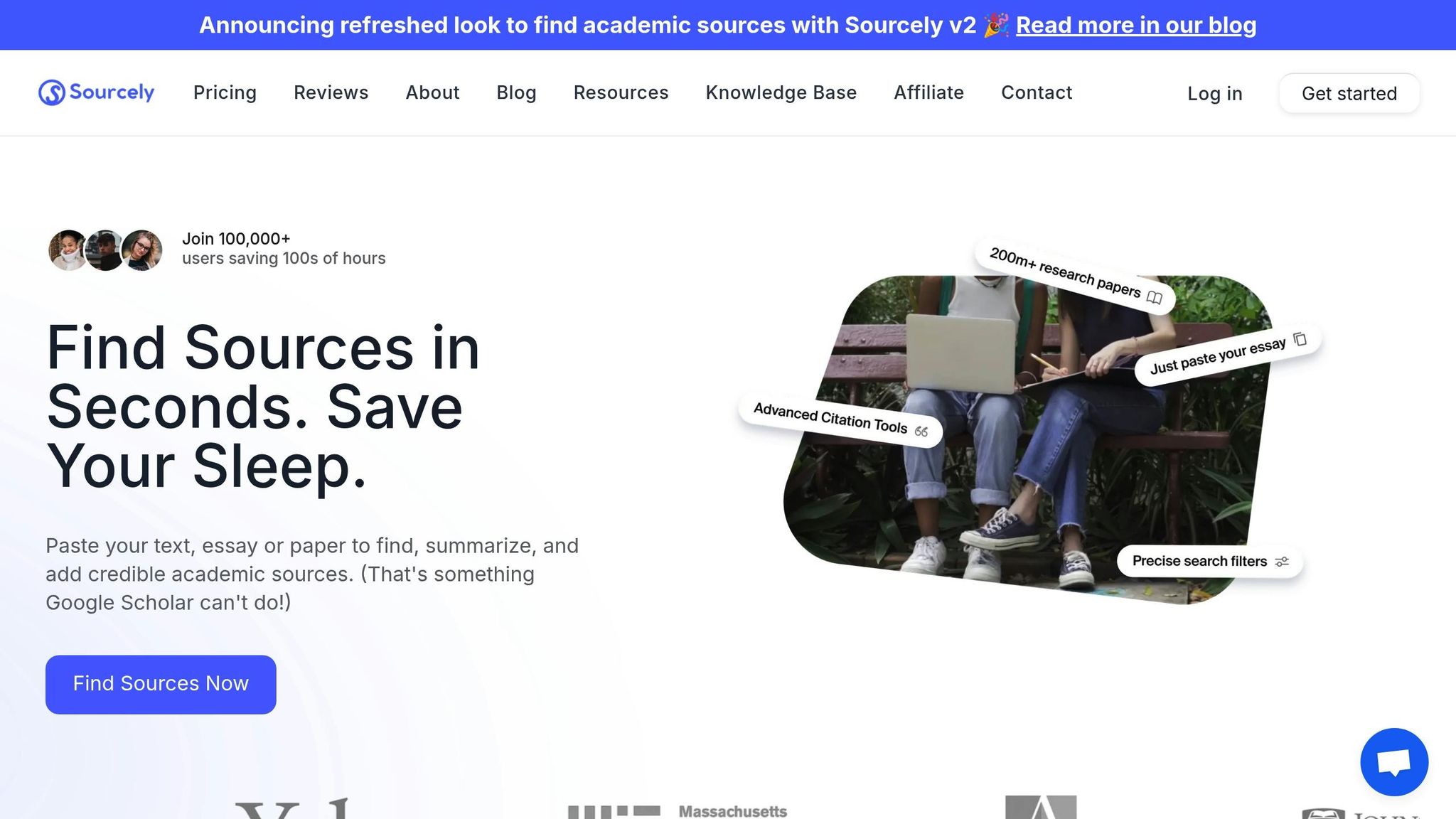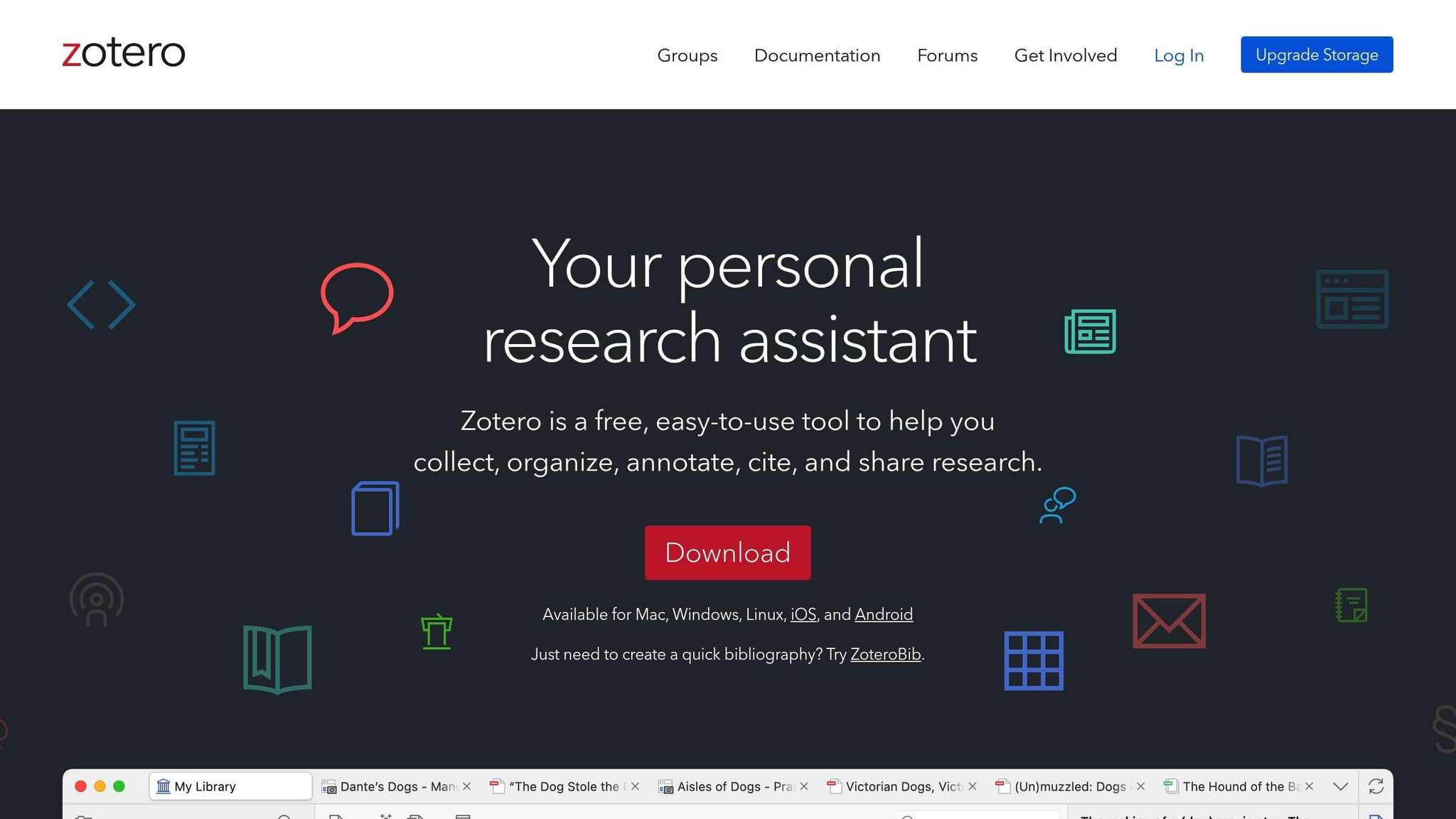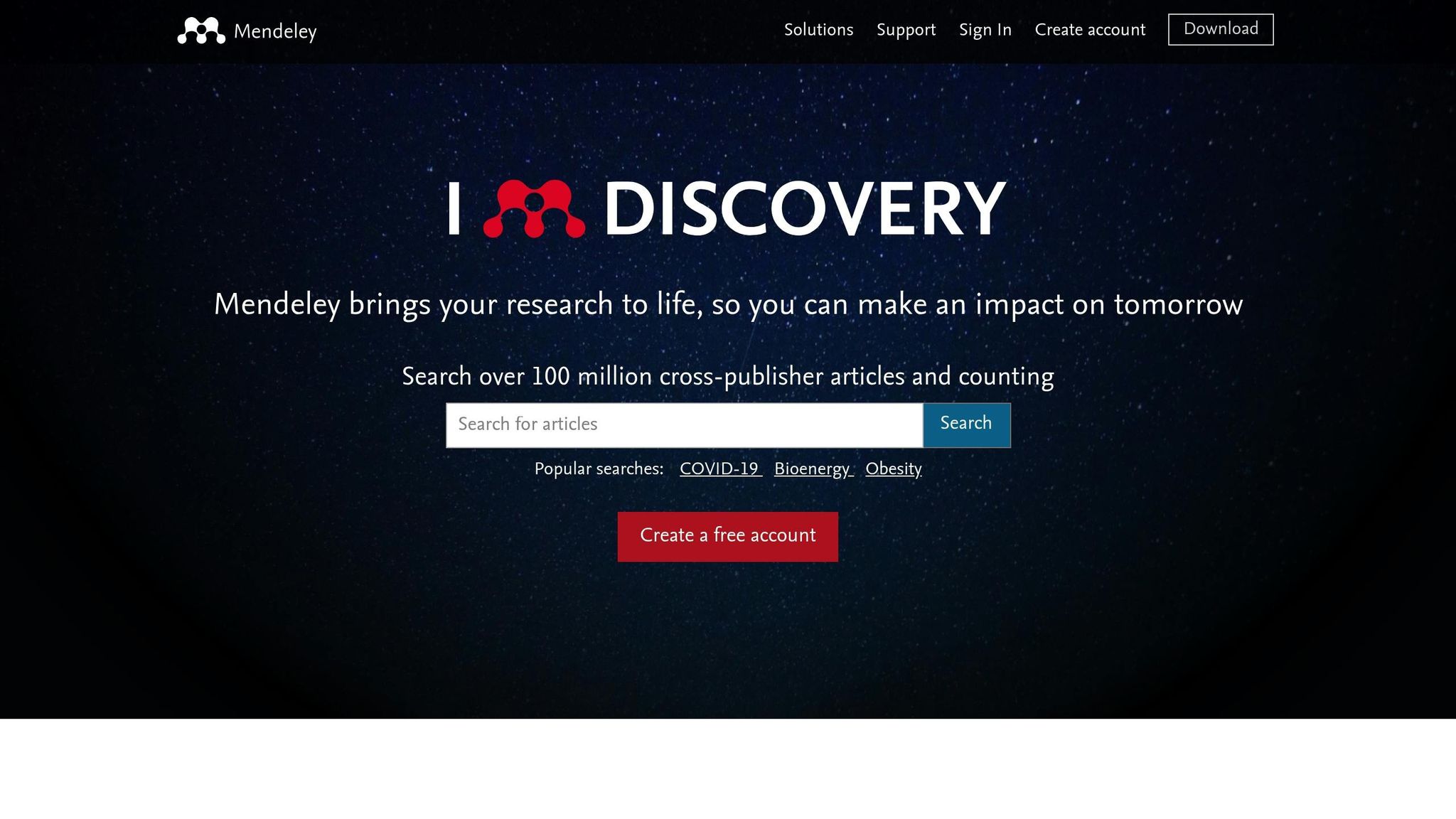
Best Literature Mapping Tools
If you're overwhelmed by academic research, literature mapping tools can help you organize, analyze, and discover scholarly articles more effectively. These tools use AI to simplify citation management, source discovery, and research organization. Here's a quick look at three popular options:
- Sourcely: AI-powered source discovery tailored to your writing, advanced filtering, and flexible pricing.
- Zotero: Great for organizing, tagging, and citing sources with a user-friendly interface and free core features.
- Mendeley: Combines reference management with collaboration tools and a recommendation system for new sources.
Quick Comparison
| Tool | Key Features | Cost Options |
|---|---|---|
| Sourcely | Essay-based source suggestions, citation placement, Boolean filters | Free, $7 one-time, $17/month, $347 lifetime |
| Zotero | Advanced tagging, browser extension, duplicate detection | Free (300 MB), $20/year (2 GB), $120/year (unlimited) |
| Mendeley | Custom folders, PDF annotation, collaboration tools | Free, paid plans for extra storage |
Each tool caters to different needs, whether you're managing a large library, collaborating with peers, or aiming for precise citation placement. Explore their features to find the best fit for your research process.
8. LITMAPS: An AI tool used for Systematic Literature Review (SLR) || Dr. Dhaval Maheta

1. Sourcely

Sourcely is an AI-driven platform designed to assist students and researchers in finding and organizing academic sources. What sets it apart is its ability to identify exactly where each source should be cited within your work - a game-changer for those needing help with citation placement. Below, we’ll explore its standout features: source discovery, filtering tools, and pricing options.
Source Discovery
With Sourcely, you can paste your essay or draft directly into the platform. Its AI scans your text, identifies gaps where citations are missing, and suggests academic sources tailored to your topic. This eliminates the need for trial-and-error searching, offering precise recommendations based on your research context. Sourcely combs through millions of academic papers and provides concise, credible summaries, helping you quickly evaluate whether a source meets your needs before diving into the full text. Plus, it offers free PDF downloads of research papers, making scholarly material accessible even without institutional access.
Filtering Capabilities
Sourcely doesn’t stop at just finding sources; its filtering tools let you fine-tune your results. You can narrow your search by publication year, author, citation count, or title using Boolean operators like AND, OR, and NOT. It also allows you to filter by content type - whether you’re looking for articles, academic papers, or reports - ensuring the results are highly relevant to your specific research.
Pricing
Sourcely offers a free basic version for users who need limited access. For advanced features, the Pro plan is available for a one-time fee of $7 (covering up to 2,000 characters). If you need ongoing access, there’s a subscription option at $17 per month or $167 annually. For those looking for a long-term solution, the lifetime Believer plan is priced at $347.
2. Zotero

Zotero is a powerful tool for managing academic research, designed to help researchers and students collect, organize, and cite sources with ease. It supports every step of the research process, from gathering materials to creating citations.
Organizing Your Research
Zotero makes it simple to organize your sources using collections and tags. You can create custom collections to group materials by themes, research questions, or methodologies. The tagging feature allows you to label and filter your sources, making it easy to navigate even a large library.
Finding and Saving Sources
With Zotero's browser extension, saving academic sources is a breeze. When browsing databases like PubMed, JSTOR, or Google Scholar, an icon appears in your browser. With one click, you can save bibliographic details, PDFs, and web snapshots directly to your library. Zotero also includes a duplicate detection tool to help you keep your library tidy.
Advanced Search and Filtering
Zotero goes beyond simple keyword searches. Its Advanced Search feature lets you filter items by details like author, publication year, tags, or item type. It even searches within the text of PDFs. You can save these searches, and they’ll automatically update as you add new materials, ensuring you can always find what you need.
Cost and Storage Options
Zotero offers a free account with 300 MB of storage, which is sufficient for many users. If you need more space, you can upgrade: $20 per year for 2 GB or $120 annually for unlimited storage. The best part? Zotero’s core features - like organizing, tagging, and advanced searching - are available at no cost, regardless of your storage plan.
sbb-itb-f7d34da
3. Mendeley

Mendeley combines reference management with tools for collaboration, making it a go-to resource for researchers. This free software not only helps organize academic literature but also fosters connections among peers, making it particularly useful for team-based research projects.
Organizing Your Research
Mendeley’s library interface is designed for simplicity and efficiency. You can organize your research papers using custom folders and tags, keeping everything neatly sorted. It also includes a built-in PDF viewer, complete with annotation tools for highlighting text and adding notes directly to documents.
Discovering New Sources
One standout feature is its recommendation system, which suggests relevant papers based on the content of your library. Additionally, its web importer integrates seamlessly with major academic databases like PubMed, IEEE Xplore, and ScienceDirect, allowing you to save references and PDFs with just one click.
Advanced Search and Filtering
Mendeley makes it easy to filter through your library. You can sort by publication type, year, authors, or tags, and even perform full-text searches within PDFs to pinpoint specific information quickly. These features ensure that you can find the documents you need without wasting time.
Pricing Options
Mendeley operates on a freemium model. The free version includes essential tools like reference management, PDF annotation, and basic cloud storage. For those needing more storage or advanced features, paid plans are available. For the latest details, check Mendeley’s website.
Advantages and Disadvantages
Here's a breakdown of Sourcely's standout features and areas where it might fall short:
| Tool | Key Advantages | Main Disadvantages |
|---|---|---|
| Sourcely | AI-driven academic literature sourcing with precise search filters; allows users to paste entire essays for personalized recommendations; supports exporting references in various formats; offers flexible pricing, including a free option and affordable paid plans (starting at $7 for 2,000 characters, $17 per month, or a $347 lifetime plan). | None reported so far. |
Sourcely’s AI-powered features make it a valuable tool for streamlining the process of mapping out academic literature. Its ability to analyze entire essays and provide tailored suggestions saves time and ensures more accurate citations. Additionally, the option to export references in multiple formats adds to its practicality for researchers.
While the tool's strengths are clear, its effectiveness will ultimately depend on the specific needs of the user. For those looking to enhance research efficiency and reduce manual effort, Sourcely offers a solid solution. Its pricing flexibility, including a lifetime plan, adds further appeal for both occasional and regular users.
Conclusion
Selecting the right literature mapping tool can completely change how you approach research, turning what might feel like an overwhelming task into a smooth, efficient process. For researchers and students in the U.S., Sourcely offers a standout solution for sourcing and organizing academic literature.
With its AI-powered features, Sourcely lets users paste their essays and identifies exactly where citations are needed. This automation is a game-changer for graduate students and researchers juggling extensive dissertations or multi-chapter projects. By simplifying source discovery and citation placement, it saves time and ensures consistency throughout your work.
The platform also offers flexible pricing plans, catering to both occasional users and those who rely on research tools long-term. This makes it accessible without the hefty price tag often attached to similar premium tools.
In short, Sourcely combines automated source identification, precise citation formatting, and a seamless workflow to boost research productivity and simplify the academic writing process.
FAQs
How does Sourcely's AI-powered tool help me find the best academic sources for my research?
Sourcely leverages AI-powered semantic search to grasp the context behind your research questions, offering results that go far beyond basic keyword matching. It dives into the meaning of your query to pinpoint the most relevant academic sources aligned with your specific topic or area of study.
With a database of over 200 million research papers, Sourcely efficiently locates credible, high-quality references. This not only saves you valuable time but also enhances the depth and quality of your literature review. The result? Your research is backed by the most precise and relevant sources available.
What are the key benefits of using Sourcely for mapping academic literature instead of doing it manually?
Using Sourcely for mapping academic literature comes with several standout advantages that can transform how researchers and students approach their work. By automating tedious tasks like finding sources, organizing them, and managing citations, Sourcely helps you save time and reduces the risk of mistakes.
With its AI-driven tools, you can easily map out research landscapes, spot gaps in your field, and build well-organized collections effortlessly. These capabilities not only simplify your process but also make your literature reviews more accurate, efficient, and thorough than traditional manual methods.
What pricing plans does Sourcely offer, and what features are included in each?
Sourcely provides a range of pricing plans tailored to fit various needs:
- Monthly Plan: $17 per month
- Annual Plan: $167 per year (a $37 savings compared to monthly billing)
- Believer Plan: $347 for 3 years of access
Each plan comes with key features like unlimited sources, essay pasting, and factual summaries. If you only need the service occasionally, there's a pay-per-use option available for $7, which covers up to 2,000 characters in Pro mode. These choices aim to make Sourcely both practical and budget-friendly for students and researchers.